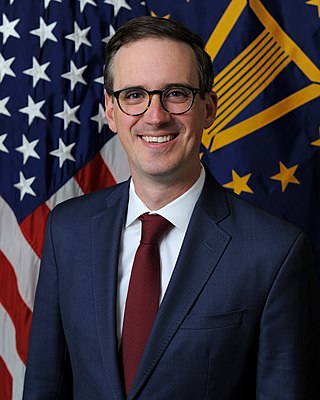
The Rendon Group is a public relations firm headed by John Rendon.

DynCorp International Inc., was an American private military contractor. Started as an aviation company, the company also provided flight operations support, training and mentoring, international development, intelligence training and support, contingency operations, security, and operations and maintenance of land vehicles. DynCorp received more than 96% of its more than $3 billion in annual revenue from the U.S. federal government. The corporate headquarters were in an unincorporated part of Fairfax County near Falls Church, Virginia, while the company's contracts were managed from its office at Alliance Airport in Fort Worth, Texas. DynCorp provided services for the U.S. military in several theaters, including Bolivia, Bosnia, Somalia, Angola, Haiti, Colombia, Kosovo and Kuwait. It also provided much of the security for Afghan president Hamid Karzai's presidential guard and trained much of the police forces of Iraq and Afghanistan. DynCorp was also hired to assist recovery in Louisiana and neighboring areas after Hurricane Katrina. The company held one contract on every round of competition since receiving the first Contract Field Teams contract in 1951.
JDS Uniphase Corporation (JDSU) was an American company that designed and manufactured products for optical communications networks, communications test and measurement equipment, lasers, optical solutions for authentication and decorative applications, and other custom optics. It was headquartered in Milpitas, California. In August 2015, JDSU split into two different companies – Viavi Solutions and Lumentum Holdings.
The Achievement Medal is a military decoration of the United States Armed Forces. The Achievement Medal was first proposed as a means to recognize outstanding achievement or meritorious service of military personnel who were not eligible to receive the higher Commendation Medal or the Meritorious Service Medal.

The Islamic Dawah Organization of Afghanistan is a political party in Afghanistan led by Abdul Rasul Sayyaf. Founded in the early 1980s as the Islamic Union for the Liberation of Afghanistan, it was originally an attempt to bring unity amongst Islamist opposition forces in Afghanistan. However, the creation of the new umbrella organization effectively created a split and the organization became a political party of its own. The organization was part of the 'Peshawar Seven', the coalition of mujahedin forces supported by the United States, Pakistan and various Arab states of the Persian Gulf in the war against the PDPA government, Soviet forces and Ba'athist Iraq. Through the financial aid received from Saudi sources, the organization was able to attract a considerable military following. Arab volunteers fought in the militia forces of the organisation.
The Khawr Abd Allah is today an estuary, but once was the point where the Shatt al-Arab emptied into the Persian Gulf. It is located in southern Iraq and northern Kuwait. Both countries' border divides the lower portion of the estuary, but adjacent to the port of Umm Qasr, the estuary becomes wholly Iraqi. The Shatt al-Arab is now the from which the rivers drain out and is east of the Khawr Abd Allah. As the estuary extends northwestward into Iraq, it changes its name to Khawr az-Zubayr at Umm Qasr. From that point, it links by canal again to the northwest and into the Tigris and Euphrates proper. It forms the northeastern coastline of Jazirat Bubiyan and the northern coastline of Jazirat Warbah. Both of these islands are officially Kuwait.

Iraqi Republic Railways Company is the national railway operator in Iraq.

The National Military Academy of Afghanistan (NMAA) was one of three academic institutions of the Marshal Fahim National Defense University. It was a four-year military development institution dedicated to commissioning officers for the Afghan National Army (ANA) and the Afghan Air Force (AAF). The mission of the NMAA was to produce officers for the Afghan Armed Forces that also have a four-year college level bachelor's degree. The academy was based upon the United States Military Academy and United States Air Force Academy. After the fall of the Islamic Republic of Afghanistan on August 15, 2021, to the Taliban, and the simultaneous collapse of the Afghan National Army and Afghan Air Force the same day, the Academy was officially shut down.
During the Iran–Iraq War, both Iran and Iraq received large quantities of weapons.

A joint task force is a "joint" (multi-service) ad hoc military formation. The task force concept originated with the United States Navy in the 1920s and 1930s.

The Assistant to the Secretary of Defense for Public Affairs, or ATSD (PA), is the principal staff advisor and assistant to the Secretary of Defense and Deputy Secretary of Defense for public information, internal information, community relations, information training, and audiovisual matters in support of Department of Defense activities, leading a worldwide public affairs community of some 3,800 military and civilian personnel. The Assistant to the Secretary follows the Secretary's Principles of Information in providing Defense Department information to the public, the United States Congress and the media.
Asadullah Jan is a citizen of Pakistan who was held in extrajudicial detention in the United States's Guantanamo Bay detention camps, in Cuba. His Guantanamo Internment Serial Number was 47. Joint Task Force -- Guantanamo analysts estimated he was born in 1981. However, he has stated that he was only sixteen when he was captured in 2001.
2004 was most notably marked by a series of battles in Fallujah. See Fallujah during the Iraq War.

Carrier Strike Group 11 is a U.S. Navy carrier strike group. The aircraft carrier USS Nimitz (CVN-68) is the strike group's current flagship. Other units currently assigned to the group include the cruisers USS Lake Erie (CG-70) and USS Princeton (CG-59), and Destroyer Squadron 9.

Carrier Strike Group 2 is a U.S. Navy carrier strike group, tracing its history originally to 1931. The aircraft carrier USS Dwight D. Eisenhower is the strike group's current flagship. As of Aug 2020, other units assigned to Carrier Strike Group 2 included the nine squadrons of Carrier Air Wing Three; the Ticonderoga-class cruisersUSS Philippine Sea (CG-58); USS Monterey (CG-61), USS Vella Gulf (CG-72) and the Arleigh Burke-class destroyersUSS Mitscher (DDG-57), USS Laboon, USS Mahan (DDG-72), and USS Thomas Hudner (DDG-116) from Destroyer Squadron 22.

Carrier Strike Group 5, also known as CSG 5 or CARSTRKGRU 5, is the U.S. Navy carrier strike group assigned to the United States Pacific Fleet and permanently forward deployed to the U.S. 7th Fleet. The Strike Group Flagship is the Nimitz-class aircraft carrier USS George Washington (CVN-73) which also embarks Strike Warfare Commander, Carrier Air Wing Five and its nine squadrons. As of June 2015, CSG 5 includes two Ticonderoga-class cruisers and Destroyer Squadron Fifteen, which serves as the Sea Combat Commander and is responsible for nine assigned Arleigh Burke-class destroyers.

North America Western Asia Holdings (NAWAH) is an investment firm founded in 2011. It was established by Hyatt Hotels executive chairman Thomas Pritzker and former Pentagon official Paul Brinkley to build businesses in the Middle East, Central Asia and North Africa.
The Task Force for Business and Stability Operations (TFBSO) is a division of the U.S. Department of Defense established in 2006 to stabilize the post-invasion Iraqi economy, reduce unemployment, and attract foreign investors to Iraq. In 2009, TFBSO expanded operations to include Afghanistan. TFBSO founder and former Deputy Undersecretary of Defense Paul Brinkley described TFBSO stating: “We do capitalism. We’re about helping companies make money.”

The siege of Basra, code-named Operation Karbala-5 or The Great Harvest, was an offensive operation carried out by Iran in an effort to capture the Iraqi port city of Basra in early 1987. This battle, known for its extensive casualties and ferocious conditions, was the biggest battle of the war and proved to be the last major Iranian offensive. The Iranians failed to reach their objective.












